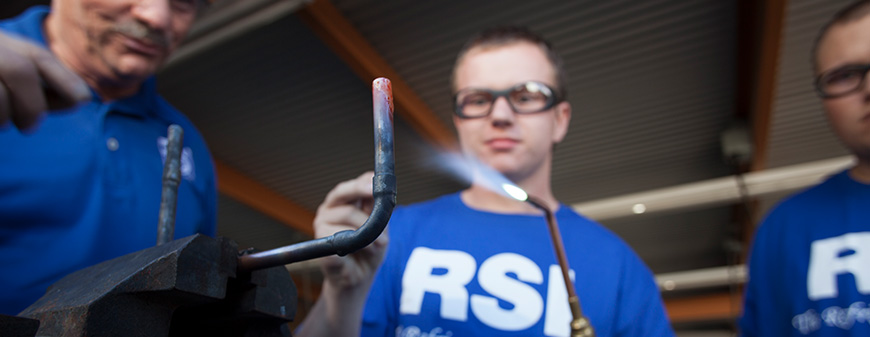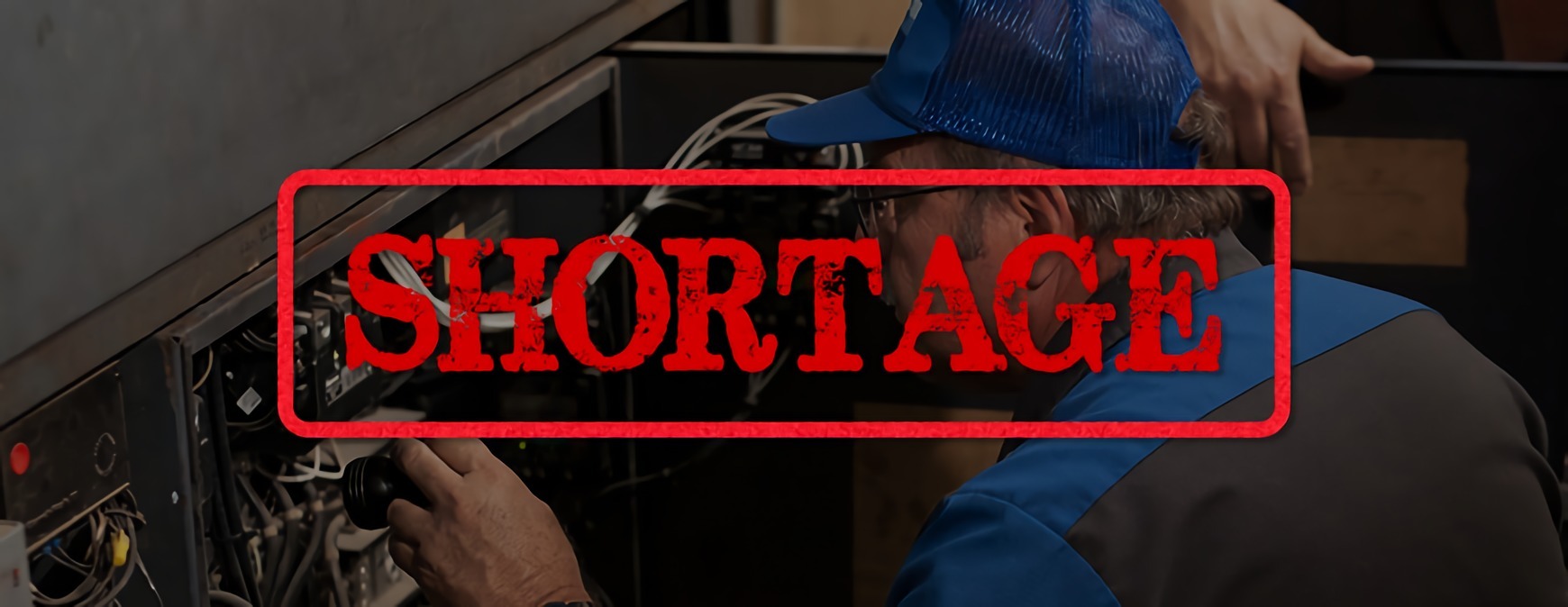RSI is a Great Training Option for Everyone
Learn more about how we can prepare you to advance your career.
The HVAC/R industry has a problem: too many jobs and not enough qualified workers to fill them.[1]
This year, 79 percent of construction firms plan to create more positions, but nearly just as many companies are concerned about being able to find and hire workers with the right skills, according to a survey by the Associated General Contractors of America and Sage Construction and Real Estate.
“Even as they are optimistic about growing demand, contractors are concerned about finding qualified workers to execute projects,” explained Stephen E. Sandherr, the chief executive officer of the association.[2]
Why is the HVAC/R industry facing a shortage of skilled technicians and what can be done to fix the issue?
Understanding the Skilled Worker Shortage in HVAC/R
Underlying the skilled trades shortage in the HVAC/R industry is a basic supply and demand problem: the field is expanding and needs more workers. On top of this, a large proportion of the current workforce is retiring.
Get Started on the Path to a New Career
Fill out our form to learn how we can help you change your life.
Newly trained technicians are not replacing them fast enough or in large enough numbers, and the push of high school students toward traditional universities isn’t helping, either.[3][4]
Growing HVAC/R Industry
The primary driver of the increasing demand for HVAC/R technicians is industry growth. The Bureau of Labor Statistics (BLS) expects HVAC/R jobs to be added at a rate of 4% through 2029.[5]
New commercial and residential building construction will likely be one source of jobs in the coming years.[6]
Innovations in HVAC/R equipment should also create the need for technicians to upgrade homes and offices with more efficient and environmentally friendly systems.
Then, of course, there are the older systems that need HVAC/R maintenance: 95 percent of the homes built since 2000 contain heating, cooling, ventilation and refrigeration equipment. These units will need the attention of technicians in the coming years as well.[7]
Retiring HVAC/R Technicians
Unfortunately, the HVAC/R workforce is not growing along with the industry. In fact, it’s shrinking. In the next 10 years, much of the current workforce is set to retire.[8]
The problem isn’t limited to the HVAC/R industry, either. Vocational careers were a popular path for Baby Boomers. As a result, many occupy positions as electricians, boiler operators and other skilled trades.
But many of these workers are 45- or 55-plus years old, which means they’ll be leaving the workforce soon. The staffing agency Adecco indicates that 31 million positions will be left vacant by 2020 because of retiring Baby Boomers.
Not Enough Newly Training HVAC/R Technicians
One of the biggest reasons for the shortage of skilled trades workers, including HVAC/R technicians, is that many young men and women choose 4-year colleges instead of trade schools because that’s been the path highlighted by parents and guidance counselors.
“Parents want success for their kids. They get stuck on [four-year bachelor’s degrees], and they’re not seeing the shortage there is in tradespeople until they hire a plumber and have to write a check,” said Mike Clifton, a machining instructor in Washington.
College, however, is not a one-size-fits-all solution to career preparation. It may not even be the best educational path for some, as many students take longer than 4 years to earn a degree or even dropout without this credential. A study by the National Student Clearinghouse of students entering public 4-year colleges in Fall 2011 found that only 41 percent earned a degree within 4 years and 17 percent dropped out within the first 4 years.
Misconceptions about HVAC/R and Trades Careers
Another reason not enough students are choosing HVAC/R school could be misconceptions about skilled trades careers.
Some may wrongly assume HVAC/R jobs don’t pay well and require difficult work.[9] The average annual salary for an HVAC/R tech is $51,420, notes the BLS. Those in the top 90th percentile take home $77,920 a year.[10]
Plus, the shortage of skilled workers is causing more and more employers to offer competitive salaries. For example, in Washington, many contractors are paying more than the state’s average annual salary of $54,000.[11]
Then there’s the perception that the country’s best and brightest students should go onto universities. But with the Internet of Things (IOT), cloud-based monitoring and controls and smart home and building technologies revolutionizing HVAC/R systems, these are exactly the kinds of students the industry needs.[12]
Connected devices aren’t the only draw for the HVAC/R industry. Those interested in green collar jobs will also likely find plenty to like about the field. New environmental regulations, demand for energy efficient products and clean units powered by solar or geothermal energy are giving HVAC/R techs more reasons to feel good about their work.[13]
Education Is One Solution

Educating men and women about all of the exciting opportunities in the HVAC/R industry is one of the first steps to addressing the worker shortage. As we noted above, many high school students are steered toward college, so they may not know about the benefits of training for and working in the trades—let alone that there is a shortage.
HVAC/R training is another solution. The industry is becoming more high-tech, which is great, but it’s also making education more important. Not only can the right HVAC/R training and certificates help up-and-coming technicians stay current with the industry, but it is also a significant factor in how much they could earn.[14][15]
Hopefully, by spreading awareness about career opportunities in HVAC/R and other skilled trades and how to seize them through vocational training, we can start closing the skills gap in these vital industries.
Want to do your part to meet the demand for skilled technicians while seizing career opportunities in the HVAC/R industry? The Refrigeration School has been training students for entry level HVAC/R jobs since 1965. Call us at 888-671-5803 to learn more about our refrigeration training program.
Additional Sources
[1] https://www.achrnews.com/articles/137083-addressing-the-labor-shortage-in-the-hvac-industry
[2] https://www.agc.org/news/2019/01/02/2019-sage-construction-hiring-and-business-outlook-survey
[3] https://www.achrnews.com/articles/137083-addressing-the-labor-shortage-in-the-hvac-industry
[4] https://www.npr.org/sections/ed/2018/04/25/605092520/high-paying-trade-jobs-sit-empty-while-high-school-grads-line-up-for-university
[5] https://www.bls.gov/ooh/installation-maintenance-and-repair/heating-air-conditioning-and-refrigeration-mechanics-and-installers.htm
[6] https://www.achrnews.com/articles/137083-addressing-the-labor-shortage-in-the-hvac-industry
[7] https://www.achrnews.com/blogs/16-guest-blog/post/136601-reasons-hvac-technicians-continue-to-be-in-high-demand
[8] https://www.achrnews.com/articles/137083-addressing-the-labor-shortage-in-the-hvac-industry
[9] https://www.achrnews.com/articles/137083-addressing-the-labor-shortage-in-the-hvac-industry
[10] https://www.bls.gov/oes/2017/may/oes499021.htm
[11] https://www.npr.org/sections/ed/2018/04/25/605092520/high-paying-trade-jobs-sit-empty-while-high-school-grads-line-up-for-university
[12] https://www.contractingbusiness.com/residential-hvac/hvac-industry-crisis-how-do-we-stop-bleeding
[13] https://www.achrnews.com/blogs/16-guest-blog/post/136601-reasons-hvac-technicians-continue-to-be-in-high-demand
[14] https://www.achrnews.com/blogs/16-guest-blog/post/136601-reasons-hvac-technicians-continue-to-be-in-high-demand
[15] https://connecteam.com/hvac-r-salary-survey-2018/
This blog has been labeled as archived as it may no longer contain the most up-to-date data. For a list of all current blog posts, please visit our blog homepage at https://www.rsi.edu/blog/




